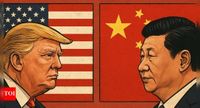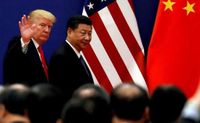In a dramatic escalation of trade tensions, the Trump administration has announced a sweeping new tariff of up to 245% on Chinese imports. This decision, detailed in a fact sheet released by the White House, comes in response to recent export restrictions imposed by Beijing and its retaliatory tariffs on American goods.
According to the White House, "China now faces up to a 245% tariff on imports to the United States as a result of its retaliatory actions." This move is part of President Donald Trump's ongoing "America First Trade Policy," aimed at protecting American industries and securing supply chains.
China's recent actions include halting exports of critical rare earth metals and minerals, which are essential for various industries, including automotive, aerospace, and military sectors. The U.S. relies heavily on these materials, with China producing approximately 90% of the world's rare earth metals. In response to these developments, Trump has framed the tariff increase as necessary to address national security risks posed by American dependence on foreign sources.
During a press briefing, White House Press Secretary Karoline Leavitt emphasized that the administration accused China of deliberately restricting vital high-tech materials, including gallium, germanium, and antimony. These elements are crucial for the military and semiconductor industries. Just last week, China suspended exports of six heavy rare earth metals, tightening its grip on components critical to global supply chains.
As the tariff war escalates, China has retaliated by increasing its tariffs on U.S. goods to 125%. This tit-for-tat exchange has raised concerns about the potential for a prolonged trade conflict that could impact global markets. Trump has repeatedly stated that the ball is in China's court, insisting that it is up to Beijing to negotiate a deal.
In a statement on social media, Trump declared, "The United States is taking in RECORD NUMBERS in Tariffs, with the cost of almost all products going down, including gasoline, groceries, and just about everything else. Likewise, INFLATION is down. Promises Made, Promises Kept!" His comments come amid widespread concern over rising prices and market turmoil, with many economists warning that the trade war could lead to a global recession.
In a related development, Honda announced it would relocate production of its five-door Civic hybrid model from Japan to America. This decision is a direct response to the 25% tariff imposed by the U.S. on foreign-made vehicles, which has significantly affected automakers that export cars to the American market.
Meanwhile, Ryosei Akazawa, Japan’s minister responsible for negotiating trade with the U.S., is set to visit Washington in an effort to persuade the Trump administration to ease steep tariffs on Japanese goods. Japan currently faces a 24% reciprocal tariff from the United States, although these tariffs have been paused for 90 days to allow for negotiations.
As the trade conflict intensifies, China has appointed Li Chenggang as its new top trade negotiator, signaling its commitment to navigating the ongoing tensions. Chinese officials, including foreign ministry spokesperson Lin Jian, have asserted that their retaliatory actions are "completely reasonable and legal," aimed at safeguarding the country’s rights and upholding fairness in international trade.
In a recent statement, Lin warned that China is "not afraid" to fight a trade war with the United States. He reiterated calls for dialogue, emphasizing the need for negotiations based on equality, respect, and mutual benefit.
Additionally, the U.S. government plans to scrap the "de minimis" exemption, which currently allows imports under $800 to enter tax-free. Starting May 2, 2025, a steep 120% tariff will be imposed on small-value items from Hong Kong, further straining relations between the U.S. and the region. Hong Kong’s postal service has announced it will stop shipping small parcels to the United States in response to these new tariffs.
As part of the ongoing trade war, Trump has also hinted at the possibility of temporarily exempting the auto industry from previously imposed tariffs. This move aims to give car manufacturers time to realign their supply chains. Experts, however, caution that short pauses may not provide sufficient time for automakers to adjust their extensive global supply chains.
Despite the rising tensions, China recently reported that its economy grew by 5.4% in the first quarter of 2025, surpassing forecasts. Industrial output climbed by 6.5%, and retail sales increased by 4.6% year-on-year. However, Chinese officials have acknowledged that the global economic environment is becoming more complex and severe, indicating that more needs to be done to boost growth and consumption.
As the situation unfolds, the potential for a resolution remains uncertain. The Trump administration continues to pursue its aggressive trade policies, while China seeks to assert its position on the global stage. The unfolding trade war underscores the delicate balance of international relations and the broader implications for the global economy.
While both nations appear entrenched in their positions, the future of U.S.-China trade relations remains a critical issue for businesses and consumers alike. As tariffs continue to rise, the impact on everyday products and the overall economic landscape will be closely monitored by analysts and policymakers.







